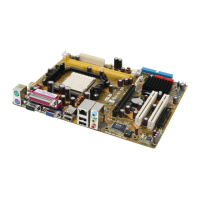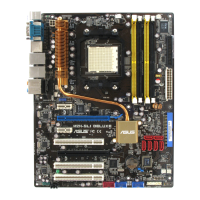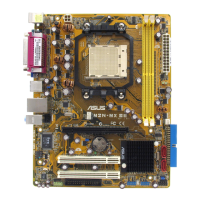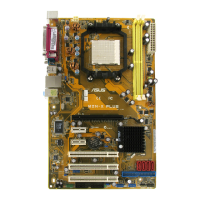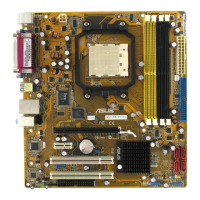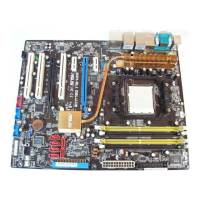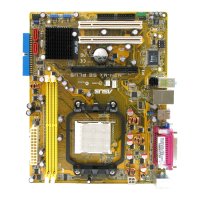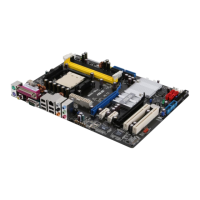Do you have a question about the Asus M2N-X and is the answer not in the manual?
Details the device's compliance with Part 15 of FCC Rules regarding radio frequency emissions.
Confirms compliance of digital apparatus with Canadian radio noise emission regulations.
Guidelines to prevent electrical shock hazards during system operation and maintenance.
Recommendations for safe handling, installation, and operation of the motherboard.
Explains how the user guide is structured into chapters and topics.
Directs users to ASUS websites and optional documentation for more details.
Defines symbols and typography used to convey important information and instructions.
Details processor socket, chipset, and memory support for the M2N-X motherboard.
Lists expansion slots, storage interfaces, and LAN capabilities of the motherboard.
Highlights USB support, overclocking features, and unique ASUS technologies.
Summarizes BIOS features and details the rear panel connectivity options.
Lists internal connectors and manageability features of the motherboard.
Specifies the motherboard form factor and lists contents of the support CD.
Provides a welcome message and lists items included in the motherboard package.
Introduces key features such as latest processor technology and memory support.
Details technologies like AMD Cool 'n' Quiet, NVIDIA nForce, DDR2, PCI Express, SATA, LAN, and USB.
Describes the onboard High Definition audio CODEC and its capabilities.
Highlights unique ASUS features such as Fanless Design, CrashFree BIOS 2, and EZ Flash.
Lists essential precautions to take before installing components to avoid damage.
Explains the function of the standby power LED on the motherboard.
Provides a visual diagram illustrating the layout of motherboard components.
Details correct orientation for installation and screw hole locations.
Guides on finding the CPU socket and unlocking the retention lever.
Instructions for correctly placing and securing the CPU into the socket.
Details on connecting the CPU fan cable to the motherboard connector.
Provides steps for installing the CPU heatsink and fan assembly.
Details on attaching and securing the heatsink assembly using the retention bracket.
Describes DIMM sockets and guidelines for memory configurations.
Lists approved vendors and models for DDR2 800 memory modules.
Lists approved vendors and models for DDR2 533 memory modules.
Step-by-step instructions for installing and removing DIMM modules.
Guides on how to install and configure various expansion cards.
Details standard interrupt assignments and IRQ assignments for this motherboard.
Describes PCI, PCI Express x1, and PCI Express x16 slots and their uses.
Instructions for clearing the CMOS RTC RAM using the CLRTC jumper.
Explains jumpers for enabling or disabling keyboard wake-up features.
Describes rear panel ports like PS/2, Parallel, LAN, Audio, and USB.
Details internal connectors such as floppy drive, IDE, and USB headers.
Explains the 40-pin IDE connectors for Ultra DMA devices.
Describes the 7-pin SATA connectors for hard drives and optical drives.
Details connectors for CPU/Chassis fans and the onboard speaker.
Covers more USB connectors and the optical drive audio input connector.
Explains the 10-pin AAFP connector for front panel audio modules.
Details the 24-pin EATXPWR and 4-pin ATX12V power connectors.
Describes the F_PANEL connector for power/reset buttons and LEDs.
Introduces utilities for managing and updating the motherboard BIOS.
Provides instructions for creating bootable floppy disks for DOS or Windows environments.
Explains how to update the BIOS using the ASUS EZ Flash utility from POST.
Details how to copy the current BIOS file using the AFUDOS utility.
Guides on updating the motherboard BIOS using the AFUDOS utility in DOS.
Explains how to recover a corrupted BIOS using the CrashFree BIOS 2 utility.
Details the process of recovering the BIOS from the motherboard support CD.
Instructions for installing the ASUS Update utility within the Windows environment.
Guides on updating the BIOS using the ASUS Update utility over the internet.
Explains how to update the BIOS using a downloaded BIOS file with ASUS Update.
Explains how to enter and navigate the BIOS setup utility.
Describes the BIOS menu bar, menu items, and navigation keys.
Details sub-menu items, configuration fields, pop-up windows, scroll bars, and help.
Allows adjustment of the system's current time and date.
Configures settings for the installed floppy disk drive.
Covers configuration for IDE controllers and SATA modes.
Provides detailed settings for IDE devices like Type, LBA, PIO, and DMA modes.
Details settings for SATA devices including LBA, Block Transfer, PIO, DMA, and SMART.
Shows detected BIOS, processor, and system memory information.
Allows configuration of system frequency and voltage for overclocking.
Configures CPU and PCI-Express frequencies and overclocking options.
Displays and configures CPU-related information like GART, Microcode, and Cool'n'Quiet.
Covers advanced chipset settings including memory controller and Southbridge.
Details memory settings like Memclock Mode, CAS Latency, and timings.
Includes settings for MCT Timing Mode, Bank Interleaving, and DQS Signal Training.
Settings for DRAM ECC, 4-Bit ECC Mode, and DRAM scrubbing options.
Configures settings for the Southbridge/MCP65 chipset, including graphics adapter and audio.
Allows adjustment of Hyper Transport frequency and link width settings.
Configures onboard devices like serial ports, parallel ports, and their IRQ/DMA settings.
Settings for Plug and Play OS, PCI Latency Timer, and IRQ allocation.
Configures USB controllers, legacy USB support, and USB 2.0 mode.
Configures system suspend states and ACPI version features.
Manages power-on events like AC power loss and wake-up by devices.
Displays CPU/MB temperatures, fan speeds, voltages, and Q-FAN status.
Sets the sequence of devices for system boot-up.
Configures Quick Boot, Full Screen Logo, and other boot-related options.
Allows setting supervisor and user passwords for system security.
Defines user access levels and manages user passwords.
Options to save changes and exit the BIOS setup utility.
Allows loading default settings or discarding unsaved changes.
Guidance on installing supported operating systems like Windows 2000/XP/Vista.
Describes the contents of the motherboard support CD and how to run it.
Details the drivers available on the support CD for system devices.
Lists and explains the software utilities available on the support CD.
Instructions on how to create RAID driver disks from the support CD.
Guides on how to access supplementary user manuals from the support CD.
Provides ASUS contact details and general motherboard specifications.
Explains how to browse the CD contents and access technical support forms.
Detailed steps for creating and installing RAID drivers during OS setup.
| ECC | Yes |
|---|---|
| Number of memory slots | 2 |
| Maximum internal memory | 4 GB |
| Processor socket | Socket AM2 |
| Processor manufacturer | AMD |
| CPU fan connector | No |
| Number of SATA connectors | 4 |
| Number of EATX power connectors | 1 |
| Manageability features | WOR (Ring), WOL/WOR (PME), PXE |
| Controller interface type | Serial ATA |
| Controller 2nd interface type | UltraDMA 100/66/33 |
| USB 2.0 ports quantity | USB 2.0 ports have a data transmission speed of 480 Mbps, and are backwards compatible with USB 1.1 ports. You can connect all kinds of peripheral devices to them. |
| Motherboard form factor | ATX |
| Compatible operating systems | Windows Vista/XP/2000 |
| Bundled software | Drivers ASUS PC Probe II ASUS Update NVIDIA MediaShield RAID |
| BIOS memory size | 32 Mbit |
| Depth | 193 mm |
|---|---|
| Width | 305 mm |
